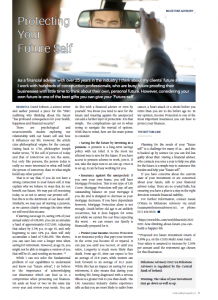In the latest edition of Irish Building Magazine, Susan reflects on our need to look after our “Future Self”.
As a financial adviser with over 25 years in the industry, I think about my clients’ future a lot. I work with hundreds of construction professionals, who are busy future proofing their businesses with little time to think about their own, personal future. However, considering your own future is one of the best gifts you can give your ‘Future self’.
 Recently, David Robson, a science writer and author penned a piece for the *BBC outlining why thinking about the future “has profound consequences for your health, happiness and financial security”.
Recently, David Robson, a science writer and author penned a piece for the *BBC outlining why thinking about the future “has profound consequences for your health, happiness and financial security”.
There are psychological and neuroscientific studies exploring our relationship with our future self and how it influences our life. However, the article cites philosophical origins for the concept. Dating back to 1736, philosopher Joseph Butler wrote, “If the self of person of today and that of tomorrow are not the same, but only like persons, the person today is really no more interested in what will befall the person of tomorrow, than in what might befall any other person”.
That is to say that, if you do not have a strong connection to your future self, it may explain why we behave in ways that do not benefit our future. We may put off exercising today, so as not to annoy our present self – but this is to the detriment of our future self. Similarly, we may put off starting a pension, as we cannot clearly envisage the time when we will need this income.
If starting out at age 25, saving 10% of your annual salary of €38,000, you can accumulate a fund of approximately €327,000. Adjusting that salary by 2.5% p.a. to age 45, and only beginning to save 10% p.a. then will only accumulate a fund of €186,000. This shows, you can save less over a longer time when saving for retirement. However, at age 25, you might not be able to imagine a version of you that will be 65, and needing an income. **
While I can not solve the fundamental problem of our capabilities to understand and know our “future selves”, I do believe in the importance of acknowledging our dissonance which can lead us to a compromise when protecting our finances. Set aside an hour or two on the same day every year and review your needs. You can do this with a financial adviser or even by yourself. You know you need to save for the future and insuring against the unexpected can add a further layer of protection. It is that simple. The complications can set in when trying to navigate the myriad of options. With that in mind, here are the main points to consider:
- Saving for the future by investing in a pension: A pension is a long-term savings policy with tax relief. It is the most tax efficient way to save for the future. If you have access to pension scheme in work, join it. If not, take the steps now to set one up. Once it is set up, it can be busy working for you.
- Insurance against the unexpected: If you own your own home, you will have Mortgage Protection. This is one type of Life Cover. Mortgage Protection will pay off any outstanding balance on your mortgage if you die and is designed to decrease as your mortgage decreases. If you have dependants however, Mortgage Protection alone is not enough. Death before old age is an unlikely occurrence, but it does happen for some and while we cannot live our lives expecting the worst – we can ensure our family is financially prepared for it.
- Protect your income: Income Protection is an insurance policy that pays your income in the event you become ill or injured. It can pay you until you recover, or until you retire. Longevity is much more likely than death. From age 65, Men can expect to live an average of 23.8 years, while women can look forward to an average of 25.3 years. While this has an impact on saving for your retirement, it also means that during your working life, being diagnosed with a serious illness is a greater risk to you than death. The Life Assurance industry claims experience tells us that you are more likely to suffer from cancer, a heart attack or a stroke before you retire than you are to die before age 65. In my opinion, Income Protection is one of the most important insurances you can have to protect your finances.
The Bottom Line
 Planning for the needs of your “future self” is a challenge for many of us – and this is backed up by science (so you can feel less guilty about this). Having a financial adviser, who contacts you once a year to help you plan for the future, is a simple way to outsource this burden and help your “future self”.
Planning for the needs of your “future self” is a challenge for many of us – and this is backed up by science (so you can feel less guilty about this). Having a financial adviser, who contacts you once a year to help you plan for the future, is a simple way to outsource this burden and help your “future self”.
If you have concerns about the current state of your investment or are concerned about your future, talk to your financial adviser today. There are no crystal balls, but ensuring you have a plan is a step in the right direction towards financial stability.
 Here to help you navigate your way to financial security.
Here to help you navigate your way to financial security.
The Milestone Advisory team are qualified financial services consultants. We specialise in helping professionals in the construction sector and related industries. Our team will work with you to review your finances, explaining your options in clear English.
No jargon – just the facts.
For further information please contact Darragh Hogan by email or phone: (01) 406 8020.
Milestone Advisory DAC t/a Milestone Advisory is regulated by the Central Bank of Ireland.
Warning: The value of your investment may go down as well as up.
*https://www.bbc.com/worklife/article/20220201-how-thinking-about-future-you-can-build-a-happier-life
**Projected net future investment return of 3.09% p.a. on the CERS Multi Asset Fund.
Your salary is assumed to increase by 2.50% per annum until the retirement age chosen for this illustration.





